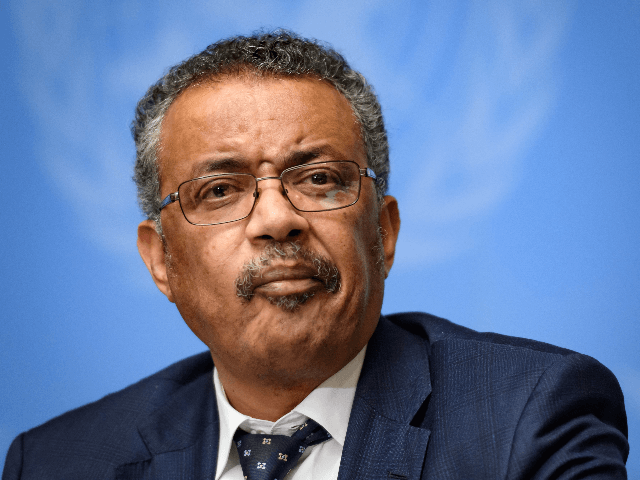The government of Taiwan attempted to warn the U.N.-led World Health Organization (WHO) of the deadly potential of the Wuhan coronavirus in December 2019, but the WHO failed to share Taiwan’s findings on the virus to the world, the country’s U.S. office confirmed to Breitbart News.
The Financial Times, citing Taiwanese Vice President Chen Chien-jen, first revealed the WHO’s failure to warn vulnerable countries about the potential for a Wuhan virus outbreak in a report last week. The Taipei Economic and Cultural Representative Office (TECRO) confirmed the report to Breitbart News this weekend.
“Taiwan did report our concern on the severity of coronavirus last December to the WHO,” TECRO said in a statement. “But as a rule, our reporting is always a one-way street. WHO mostly ignored our messages and never shared information as they do to other countries.”
TECRO noted that the WHO also falsely identified Taiwan as a province of China in its reporting on the Wuhan virus pandemic, which “misled some countries to unjustly mishandle their treatment of Taiwanese passengers or airlines when it comes to border control. That’s unfortunate as the politics confuses the international community [on] what’s the real and greater interest of international public health.”
Taiwan, technically the Republic of China, is a sovereign state south of China that has never been part of the People’s Republic of China in its history. It is a democratic state with its own military, healthcare system, education system, and diplomatic corps. It receives no financial support and is under no obligation to follow the laws of the Communist Party of China.
Beijing officially refuses to accept the sovereignty of Taiwan and imposes the “One China” policy on every country it establishes diplomatic ties with. A nation that chooses to engage Beijing in diplomacy cannot also recognize the sovereignty of Taiwan. Currently, only 15 of the world’s states, not including the United States, recognize Taiwan’s sovereignty and officially host a Taiwanese embassy.
Responding to pressure from Beijing, the United Nations also does not recognize Taiwan’s sovereignty, excluding the island nation from agencies like the WHO and the International Civil Aviation Organization (ICAO), currently run by a former Communist Party official. Pressure on both agencies to include Taiwan in its global response to the virus did not result in any changes in the way the U.N. identifies Taiwan.
Vice President Chen expressed frustration to the Financial Times that Taipei’s research on the Wuhan coronavirus as early as December indicated that the WHO should have begun warning countries at that time of the contagious nature of the virus.
“The WHO could not obtain first-hand information to study and judge whether there was human-to-human transmission of Covid-19. This led it to announce human-to-human transmission with a delay, and an opportunity to raise the alert level both in China and the wider world was lost,” Chen, also an epidemiologist, told the publication.
Taiwan reportedly had intelligence on the virus early through doctors in Wuhan. Scientists have now traced the first known novel coronavirus case back to November 17, 2019, documented in the central Chinese metropolis of Wuhan. A University of Toronto study found that warnings from doctors in Wuhan to others that they were facing a new contagious disease began appearing online in December, almost immediately followed by censorship and arrests.
Among the most famous of the eight people first arrested at the time for having “severely disturbed the social order” by warning people to distance themselves and wash their hands was Dr. Li Wenliang, a 34-year-old in Wuhan who died of coronavirus shortly after being arrested and forced to apologize for posting safety tips on a doctors’ WeChat group. WeChat is a Chinese Communist Party-approved social media network.
Popular outrage following Li’s death resulted in Beijing blaming local Wuhan Communist Party officials for arresting Li and replacing several senior regional officials with loyalists to Chinese dictator Xi Jinping.
Some of these warnings reportedly made it to Taiwan, which had built a centralized National Health Command Center (NHCC) to deal with public health crises in the aftermath of the 2003 Sudden Acute Respiratory Syndrome (SARS) viral outbreak. Taiwan rapidly began acting to limit travel into the country from affected areas and put emergency precautions into place. During this time, Taipei also claims to have alerted the WHO, to no avail.
The Communist Party of China shut down a “wet market” in Wuhan – where individuals could freely sell wild animal meat for consumption – on January 1, believing it to be the source of the virus. It made public the existence of a viral outbreak on January 20; subsequent studies have cast doubt on the wet market being the origin of the virus.
On January 14, nearly a week before Beijing revealed the outbreak to the public but nearly two months since the diagnosis of the first coronavirus case, the WHO said on Twitter, “preliminary investigations conducted by the Chinese authorities have found no clear evidence of human-to-human transmission of the novel #coronavirus (2019-nCoV) identified in #Wuhan, #China.”
Doctors have subsequently warned that the virus is highly contagious, more so than many strains of influenza.
The University of Southhampton concluded in a recent study the Communist Party of China could have stopped as many as 95 percent of the world’s coronavirus cases if it had listened to the instructions of the doctors it silenced and detained in Wuhan.
At press time, Taiwan has documented 195 cases of Wuhan coronavirus and two deaths.

COMMENTS
Please let us know if you're having issues with commenting.